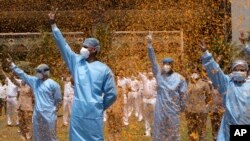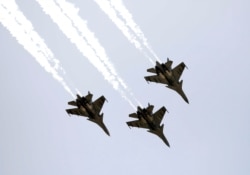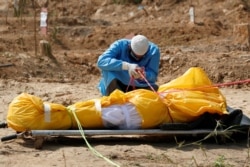Air force planes flew over major Indian cities and helicopters showered flower petals on hospitals as a tribute to healthcare workers on the front lines of the fight against the coronavirus pandemic even as India witnessed its highest single-day jump in infections and shut down for another two weeks.
Confined to their homes, people craned their necks from balconies and stood on rooftops to catch sight of the fighter jets as they flew low over a dozen deserted cities, from Srinagar in the Himalayas to Thiruvanathapuram in the south, Sunday morning.
As helicopters dropped petals on hospitals in cities including New Delhi, Mumbai and Bengaluru, some health workers stood outside — a brief moment of respite from the grueling fight to contain the infection.
Military bands played outside some hospitals and the navy plans to light up ships anchored along the coast in the evening.
The armed forces called it a tribute to doctors, nurses, sanitation workers, police, home guards, delivery boys and the media.
“We wholeheartedly appreciate the gesture by the army, navy and air force, the armed forces,” said Srinivas Rajkumar, the general secretary of the Resident Doctor's Association of the country’s premier government hospital, All India Institute of Medical Sciences, in New Delhi. “But the government should also pay attention to shortcomings in preparedness which will decide the final outcome of the battle against COVID-19," he told local media.
The tribute by the armed forces came as Indians prepared to spend another two weeks at home — India’s 40-day shutdown that was due to end Sunday has been extended until May 17.
India’s battle against the coronavirus pandemic is centered largely in its big cities, where most of the nearly 40,000 cases have been reported.
On Saturday the number of infections rose by 2,644 — the highest in one day — while 83 people died, also the highest in a single day, taking the country’s death toll to over 1,300.
Indian health authorities say its stringent six-week lockdown has helped in containing the number of infections in the crowded country of 1.3 billion to levels far below those seen in several Western countries.
Public health experts say that may be true, but say that due to low testing, the actual spread of the disease may not be accurately reflected in the numbers.
“There is nothing to cheer about. We have to expect that the avalanche is hitting us,” warned Jacob John, former professor of virology at the Christian Medical College in Tamil Nadu.
“The doubling time for coronavirus cases in India is exactly the same as countries like Italy had early on. So we are just like any other country,” he said.
The government is easing some restrictions starting Monday in areas where the coronavirus is not rampant by allowing some shops and offices to reopen and industries to restart.






